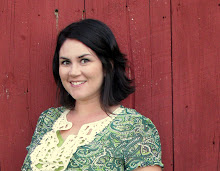
Tuesday, March 17, 2009
Animal, Vegetable, Miracle Book Discussion

Monday, May 26, 2008
It's Easy Being Green: A Handbook for Earth-Friendly Living by Crissy Trask

Upon further inspection, I decided it was definately worth a buy and read. It is printed on recycled paper, and offers a section with specific and effective tips to follow on your path to a green life. Each tip has boxes for you to check off for ones you want to target, are currently working on, or have achieved. These are great, and are targeted at those of us who are busy and need some hand holding. From saving paper, to saving energy and everything in between, these practical tips will empower the average person to feel like they are making progress.
So often our desires to "go green" leave many of us feeling overwhelmed and uninspired. When we start to hear of all the problems that the green movement wants to tackle, it seems like a hurdle that is impossible to jump. Trask takes these worries to task, and devotes an entire chapter to green myths. Other chapters include Buying Green, Getting Involved and Resources. This book deserves a place on my bookshelf, as I continue to work through the tips, step by step. To quote the book quoting Plato: "Never discourage anyone who continually makes progress, no matter how slow."
Thursday, April 24, 2008
Serve God, Save the Planet Review

Our family has recently made the commitment to go green; we have started recycling, changed out all of our lightbulbs and have begun analyzing our lifestyle for more ways to conserve. There is so much talk of “green”, that this can become a daunting task. Sleeth brings it down to the personal level, and truly presents the challenge as one that can be accomplished. Although I cannot imagine myself giving up my clothes dryer as the Sleeth family has, the overall theme of the book is to consume less, and think more about our impact.
One of the most encouraging themes of the book is the Christian aspect of Creation Care. Our maker has created an entire world for us to be caregivers of, and Sleeth points out that it is our duty and responsibility. He writes, “The Christian is not at liberty to do whatever he likes. Christians are constrained by conviction to think about their lives, their actions, and their responsibilities.” The Christian community as a whole has been slow to come on board, even as Ford, BP, and other big polluters are greenwashing their ads. Many Christians want to distance themselves from the “fanatic, hippie, new age” stereotypes that environmentalism conjure up. Sleeth points out that many of the rules for simple living and environmentalism are supported by the Biblical principles that all Christians hold dear, like the Golden Rule and the Ten Commandments. He argues that as Christians, our worship is in every action we do, and failing as stewards of the planet is a direct contradiction to our call to worship.
Even if you are not a Christian, I believe the same principles can be applied to your life. Will this “thing” make you happier? Do we have a larger responsibility to our fellow man to care for this earth? Sprinkled in with practical suggestions and startling statistics, Sleeth tells the stories from his days in the ER. They illustrate the themes that all “greenies” embrace: Live Simply, Waste Less, Stewardship.
Much of the green message that Sleeth writes is interwoven with medical stories and commentaries, some of which are over-generalized. Issues like cancer, depression, medications and health insurance are very complicated, and need to be dealt with more in depth than this book did. However, I didn’t feel like this distracted to much from the overall theme of the book.
If you are a Christian wondering what the green fuss is all about, I suggest you run out to your local bookstore, or go online and order it. As Francis Schaeffer wrote, “If I am going to be in the right relationship with God, I should treat the things he has made in the same way he treats them.”







